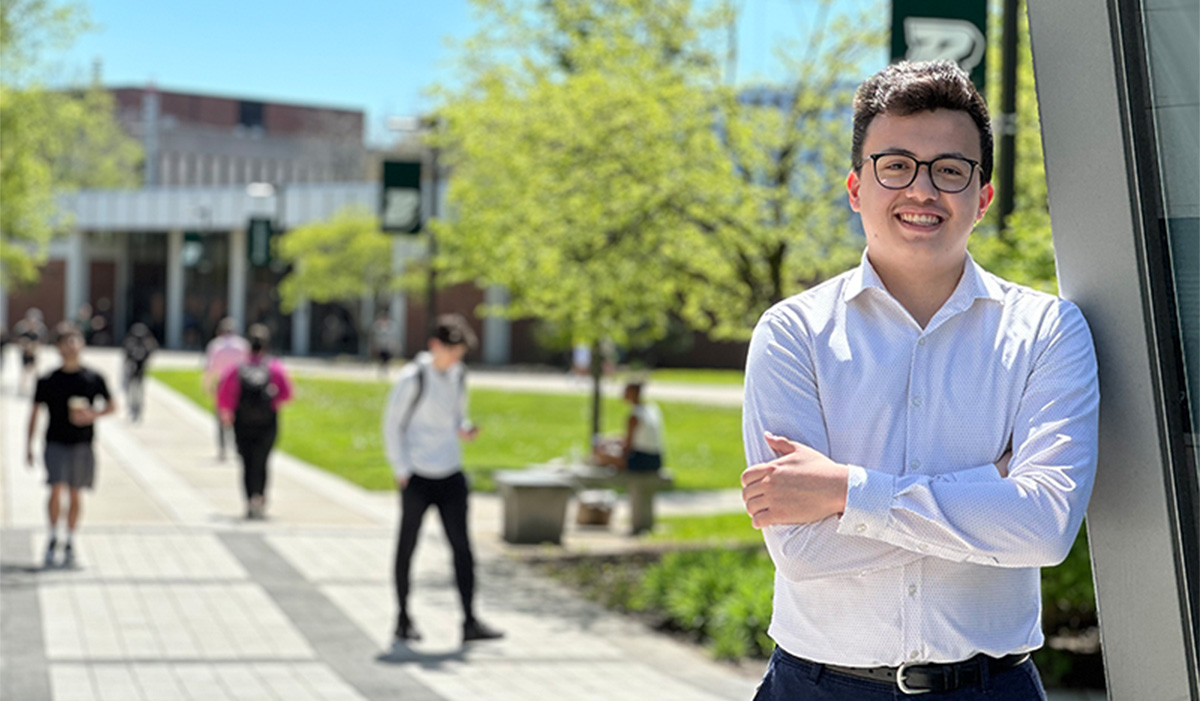Binghamton University business student’s networking skills set stage for consulting career
School of Management's Chad Burks is enrolled in the Transformational Leaders Program and member of PwC Scholars

The first round didn’t go so well. It was a case competition centered on Airbnb, and Chad Burks’ team finished last in a stiff competition with fellow first-year students in the Dean’s Mentoring Program at Binghamton University’s School of Management (SOM).
It was a tough blow for Burks and his teammates, but they were hungry. They worked late nights. They revisited their approach and fine-tuned their strategy. And it paid off: they came in first place during the third and final round after making their presentations at KPMG in New York City before a panel of industry professionals.
“I’m proud of that for a few reasons, but most of all, it proved to all of us that you can get knocked down, make a comeback and really learn something from it,” said Burks, a third-year business administration major from Clifton Park, N.Y. “It’s not always about the result, but anytime you can achieve that result you were working so hard for, it sure feels a lot sweeter.”
It’s that kind of tenacity that has defined Burks throughout his academic career at Binghamton, where he’ll begin his senior year in the fall. He’s a firm believer that opportunities are always out there as long as you take advantage of them.
A student in SOM’s nationally recognized Transformational Leaders Program and a member of PwC Scholars, Burks has learned the value of surrounding oneself with people who believe in you so you can reach your full potential and become a change agent in the community.
He’s also discovered how networking can mean different things to different people, but one thing is clear: networking means more than simply seeking out professionals who might one day help connect you with a job.
“I think a common mistake students can make is getting on networking calls and essentially asking, ‘Can you give me a job?’ When you network, you should really be focused on getting to know who they are as a professional and as a person,” Burks said. “Not only does that mean asking what their daily job is like, but also what they do in their free time, and maybe what makes them happy in their role. You show your interest and that you’re willing to learn.”
With that approach in mind, Burks has landed two summer internships with PwC, both of which have sharpened his skill sets while allowing him to explore a career path in consulting.
Last summer, much of his internship required the use of data visualization platforms and skills he’d already picked up by working with different student business clubs, and the experience showed him just how pivotal they could be in a professional setting. He’ll spend his summer 2024 internship with PwC in a more client-facing role based in Boston, performing cyber consulting.
Burks’ work during his five first-place finishes in SOM case competitions cultivated his interest in consulting. He realized through those experiences that he had a talent for solving complex business problems by first pinpointing the root cause, which often isn’t as simple as it sounds.
“It’s really about determining what needs to be addressed, then using an outside-the-box mindset by exploring what other companies in the client’s industry are doing,” Burks said. “How successful is it, or isn’t it? What can I take from that and try to optimize it so that it can give the best solutions to that client?”
Mentors have always played pivotal roles in Burks’ academic and professional journey, so when he got the chance to run the MGMT 111 course’s mentoring program this past year, it was a way to return the favor. Burks assigned 440 students to mentor groups in the fall (more than 100 in the spring) and tracked their progress each semester.
“Knowing that I facilitated an experience that helped so many new SOM students learn professional development – resumes, networking, building LinkedIn profiles – is so rewarding,” he said. “And, isn’t that really what SOM is all about? It’s how you can use what you know to help others, so they’ll be willing to give back when they’re in a position to.”

